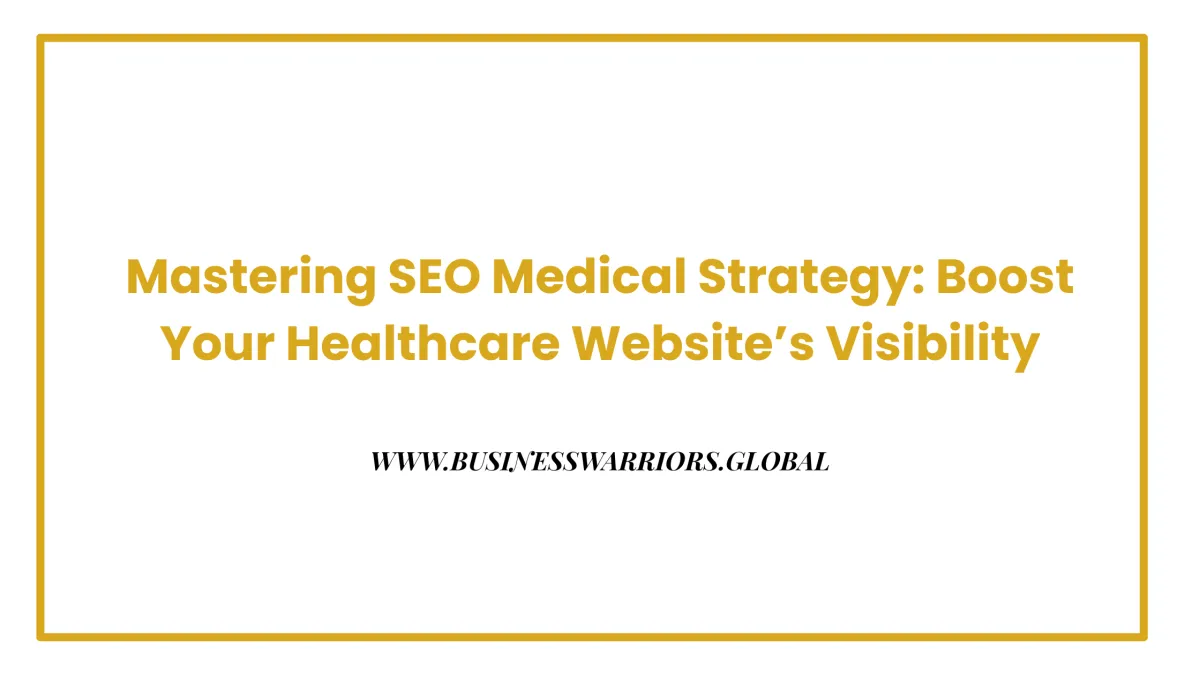
Mastering SEO Medical Strategy: Boost Your Healthcare Website’s Visibilit
Introduction to Medical SEO
Medical SEO services improve online visibility for healthcare providers, enhancing their presence in search engine results. The complexity and competitiveness of the healthcare landscape, driven by the large number of healthcare practitioners and their long-term investment in SEO, make it essential for providers to adopt targeted SEO strategies to stand out and build trust with potential patients.
Effective SEO strategies for healthcare websites involve search engine optimisation techniques tailored to the medical industry, addressing its unique challenges and compliance requirements.
Healthcare SEO services cost varies, but investing in quality search engine optimization supports long-term healthcare marketing success.
A well-planned SEO strategy is crucial for healthcare providers to attract potential patients and increase patient engagement. SEO is important for healthcare providers because it builds trust, credibility, and visibility in a crowded market. This makes seo important in the healthcare and medical industry, as it helps attract patients, build trust, and stand out among competitors. Health-related and healthcare searches generate one billion queries daily on Google, highlighting the importance of a strong online presence.
Understanding Medical SEO For the Healthcare Sector
Medical SEO, or search engine optimization for healthcare, is a specialized approach to improving the online visibility and search engine rankings of medical websites and healthcare providers. By leveraging proven SEO strategies—such as in-depth keyword research, on-page optimization, and authoritative link building—healthcare providers can ensure their healthcare services are easily found by patients searching for care online. Effective medical SEO not only increases website traffic from search engines but also helps establish a healthcare provider’s reputation as a trusted authority in the medical industry.
A strong medical SEO strategy focuses on identifying the keywords and phrases that potential patients use when searching for medical services. By optimizing medical websites for these relevant terms, healthcare providers can improve their search engine rankings and attract more patients. Search engine optimization also involves creating high-quality, informative content that addresses patient needs and complies with industry regulations. Ultimately, investing in medical SEO is essential for healthcare providers who want to boost their online visibility, drive more patients to their practice, and stay competitive in the evolving healthcare landscape.
Developing an Effective SEO Strategy To Help You Rank On The Search Engines
A healthcare SEO strategy should focus on keyword research to identify relevant keywords used by patients searching for medical services, while also implementing the right SEO strategy tailored for healthcare providers.
SEO strategies for healthcare providers must comply with medical regulations and ensure high-quality, informative content. Analyzing keyword strategies used by competitors can help identify opportunities for improvement and differentiation.
Local SEO is vital for healthcare businesses to attract local patients and improve online visibility in local search results. Understanding the target audience is essential when developing local SEO strategies to address their specific needs and search behaviors.
A comprehensive SEO strategy includes technical SEO, content creation, and link building to enhance search engine rankings. The importance of local SEO ranking factors, such as Google Business profiles, online reviews, and backlinks, cannot be overstated. SEO in healthcare operates under a stricter ethical framework and regulatory standards compared to general SEO practices.
Effective SEO for healthcare requires a deep understanding of the unique challenges and regulations within the healthcare sector, ensuring strategies are tailored to build trust, authority, and visibility.
Creating a Patient-Centric Website That Supports Increasing Your Search Rankings
A patient-centric website is the cornerstone of a successful healthcare SEO strategy. For healthcare providers, designing a website that prioritizes the needs and expectations of potential patients is essential for building trust and increasing online visibility. Start by ensuring that your website is easy to navigate, with intuitive menus and clear calls to action that guide visitors to important healthcare services and information. Incorporate relevant keywords such as “healthcare services” and “medical professionals” throughout your medical content to help search engines understand your offerings and improve your search engine rankings.
Healthcare SEO services can further enhance your website by optimizing on-page elements, such as meta titles and descriptions, to align with what patients are searching for. Providing comprehensive, easy-to-understand information about your medical professionals, specialties, and patient resources not only supports SEO but also reassures visitors that they are in the right place. By focusing on the patient experience and leveraging proven SEO services, healthcare providers can attract more patients and establish a strong presence in search engine results.
Building a Strong Online Presence
For healthcare providers, building a strong online presence is essential to attract new patients, foster patient engagement, and stand out in the competitive medical industry. A robust online presence starts with a professional, user-friendly website that showcases your healthcare services and expertise. Incorporating informative content, intuitive navigation, and clear calls-to-action ensures that patients can easily find the information they need and are encouraged to connect with your practice.
Implementing local SEO strategies is another key component of online visibility. By optimizing your website for local searches and maintaining accurate listings in Australian medical directories, healthcare providers can reach more patients in their community. Consistent, high-quality content that addresses patient questions and highlights your medical specialty further strengthens your authority and trustworthiness. Leveraging these SEO strategies not only increases your visibility in search results but also helps you engage with more patients and grow your healthcare practice.
Local SEO and Patient Engagement
Local SEO strategies help healthcare providers target local patients and increase patient acquisition by optimizing for when patients search for healthcare services nearby.
Claiming and optimising a Google Business Profile is essential for local SEO and attracting local patients.
Patient reviews and ratings on local directories like Australian medical directories can significantly impact local search results.
Effective local SEO strategies involve using relevant keywords, creating informative content, and building local backlinks. Maintain consistent Name, Address, and Phone number (NAP) across all online directories to avoid confusion for search engines. These strategies improve your practice’s visibility in organic search and help attract qualified patients.
Technical SEO and Website Optimization
Technical SEO is critical for healthcare websites to ensure search engine accessibility and readability, especially when optimizing a medical website for better performance and compliance.
Website optimization involves improving page speed, mobile-friendliness, and user experience to enhance search engine rankings. For a medical website, these optimizations help the site appear higher in organic search results, making it easier for potential patients to find trusted healthcare providers. Page speed optimization is crucial as slow websites lead to higher bounce rates and lower conversion rates.
SEO experts use tools like Google Search Console and Google Analytics to track website traffic, monitor improvements in rankings on search engine results pages (SERPs), and measure SEO success.
A well-optimised website is essential for attracting more patients and improving online visibility.
Improving Website User Experience
Delivering an outstanding website user experience is vital for healthcare providers aiming to boost patient engagement and drive more conversions. A seamless user journey—characterized by clear, concise information, straightforward navigation, and fast-loading pages—encourages visitors to stay longer and explore your healthcare services. Implementing healthcare SEO strategies, such as optimizing site structure and internal linking, helps search engines crawl your site more efficiently, improving your search engine rankings and online visibility.
Technical SEO plays a key role in enhancing user experience. By optimizing images, minifying code, and ensuring your website loads quickly, you can reduce bounce rates and keep potential patients engaged. Local SEO strategies, including the use of local keywords and the creation of a robust Google Business Profile, make it easier to attract local patients searching for healthcare providers in their area. By focusing on both technical and local SEO, healthcare providers can improve online visibility, attract local patients, and foster greater patient engagement.
The Importance of Mobile-Friendliness
In today’s mobile-first world, ensuring your healthcare website is mobile-friendly is no longer optional—it’s essential. With a growing number of patients searching for healthcare providers on smartphones and tablets, a responsive, mobile-optimized website is key to capturing and retaining more patients. Mobile-friendliness not only enhances the user experience but also plays a significant role in search engine rankings, as search engines prioritize mobile-optimized sites in their results.
Healthcare SEO services can help healthcare providers implement responsive design, ensuring that your website adapts seamlessly to any device. Optimizing images and streamlining navigation for smaller screens further improves patient engagement and makes it easier for patients searching on the go to find the information they need. By prioritizing mobile-friendliness as part of your healthcare SEO and digital marketing efforts, you can reach more patients, improve your search engine rankings, and provide a superior experience for every visitor.
The Role of Social Media in Healthcare SEO
Social media has become a powerful tool for healthcare providers looking to enhance their healthcare SEO efforts and connect with potential patients. By sharing informative and engaging content on platforms like Facebook, LinkedIn, and Instagram, healthcare providers can boost their online visibility and drive more website traffic. Social media activity signals to search engines that your healthcare provider brand is active and relevant, which can positively influence your search engine rankings.
In addition to sharing educational content related to your medical specialty, social media is an excellent channel for highlighting patient reviews, testimonials, and success stories. These authentic voices help build trust and credibility with potential patients, encouraging them to choose your healthcare services. Regularly posting updates, health tips, and news also positions your practice as a thought leader in the medical industry, further supporting your SEO strategy and helping you reach a wider audience.
SEO Services and SEO Experts To Help Increase Organic Search
Healthcare SEO agencies offer specialised services, including keyword research, content creation, and link building. Working with an experienced SEO partner ensures long-term success and consistent growth for your healthcare business.
Medical SEO services require expertise in the healthcare industry and knowledge of medical regulations. Tailoring services for a healthcare business addresses the unique needs of each medical practice, ensuring compliance and effective results.
A healthcare SEO agency can help medical practices and healthcare providers develop a tailored SEO strategy and improve their online presence. Outsourcing SEO to specialized agencies helps medical practices and healthcare providers stand out online and navigate healthcare regulations effectively.
Investing in quality SEO services can lead to increased patient enquiries and improved search engine rankings.
SEO builds long-term brand authority and sustainable leads, while Google Ads delivers immediate results and measurable ROI—using both channels together creates a comprehensive digital marketing strategy.
Content Creation and Marketing
High-quality, informative content is essential for healthcare websites to attract and engage patients. Create content tailored to each medical specialty to ensure relevance and authority.
Medical writers and healthcare professionals should collaborate to create content that meets patient needs and search engine requirements. For medical websites, ensure compliance with quality standards and regulations. Develop expert-reviewed content and clearly display the author’s credentials to establish expertise and build trust.
Content marketing involves creating and promoting valuable content to attract and retain patients. Optimize content marketing strategies specifically for your healthcare practice to maximize reach and effectiveness.
Effective content creation strategies involve using relevant keywords, creating engaging content, and promoting content on social media.
Staying Up-to-Date with the Latest SEO Trends
The world of search engine optimization is constantly evolving, making it crucial for healthcare providers to stay informed about the latest SEO trends. Keeping up with changes in search engine algorithms, new ranking factors, and emerging technologies ensures your healthcare website maintains strong online visibility and high search engine rankings. Engaging with SEO experts, attending industry conferences, and following reputable digital marketing blogs are effective ways to stay ahead of the curve.
Recent trends such as the rise of voice search, the integration of artificial intelligence, and the growing importance of video content are shaping how patients search for healthcare services online. By adapting your SEO strategies to include these innovations, you can attract more patients and improve your competitive edge. Embracing ongoing learning and regularly updating your SEO approach will help your healthcare practice achieve sustained growth and success in the digital landscape.
Common SEO Mistakes to Avoid
To maximize the effectiveness of your healthcare SEO efforts, it’s important to steer clear of common mistakes that can hinder your website’s performance in search engines. One frequent error is keyword stuffing—overusing keywords in your content—which can lead to penalties and lower search engine rankings. Instead, focus on naturally integrating relevant keywords that reflect how patients search for your healthcare services.
Duplicate content is another pitfall to avoid, as copying material from other websites can damage your credibility and reduce your chances of ranking well in search engine results. Additionally, poor website design—such as confusing navigation or slow-loading pages—can drive potential patients away and increase your bounce rate. Healthcare providers should also minimize the use of abbreviations and acronyms, as these can be unclear to both patients and search engines. By avoiding these common SEO mistakes, healthcare providers can create a more effective, patient-friendly website that attracts more patients and achieves better search engine rankings.
Measuring Success and Progress
Measuring SEO success involves tracking key metrics like website traffic, search engine rankings, search rankings, and patient enquiries.
Google Analytics and Search Console provide valuable insights into website performance and SEO success.
Regular SEO audits and strategy adjustments are necessary to ensure ongoing SEO success. Competitor analysis reveals strengths and weaknesses which can help form effective SEO strategies.
A well-planned SEO strategy and continuous monitoring can help healthcare providers achieve their online visibility goals.
Conclusion and Recommendations
Mastering medical SEO requires a deep understanding of the healthcare industry, search engine optimisation, and patient needs.
Healthcare providers should invest in quality SEO services and develop a tailored SEO strategy to improve their online presence. Healthcare marketing must comply with regulations like HIPAA in the US and AHPRA in Australia, including limitations on patient testimonials and misleading claims.
Local SEO, technical SEO, and content creation are critical components of a comprehensive SEO strategy.
By following proven SEO strategies and best practices, healthcare providers can attract more patients, improve their online visibility, and achieve long-term SEO success.




